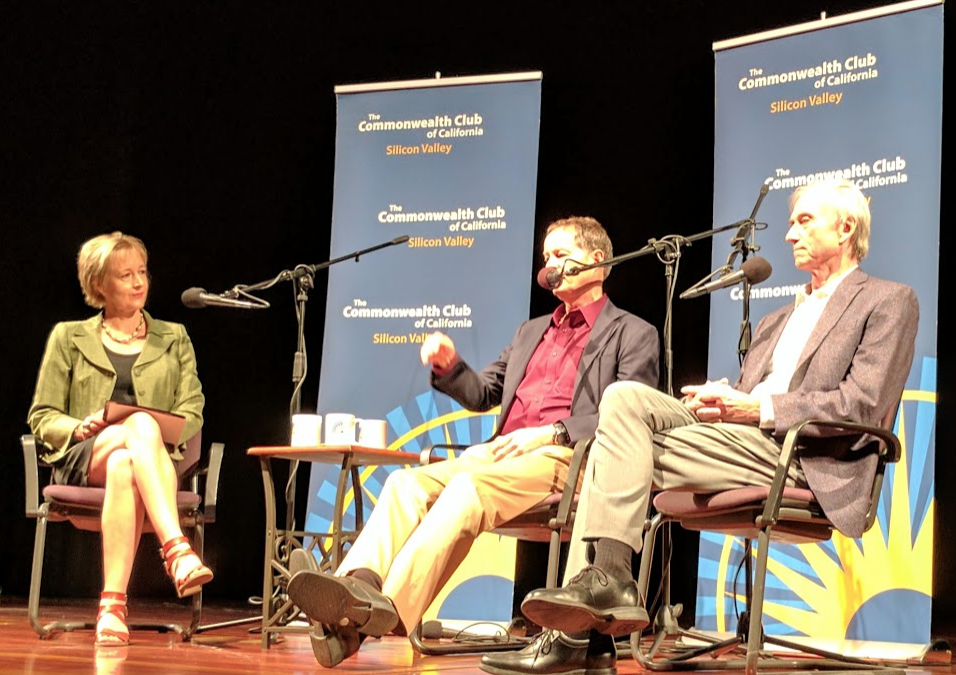Why did John Mackey, the CEO of Whole Foods make such an unexpected and rapid deal with Amazon this month? Alison van Diggelen’s recent conversation with Mackey reveals a glimpse inside the head of this provocative and feisty leader.
Days after my interview with John Mackey at the Commonwealth Club on May 1st, he began a courtship with Amazon that led to an agreed acquisition of Whole Foods by the global commerce giant. The courtship is something Mackey describes as “truly love at first sight.” Our conversation took place as news circulated of a potential bid by Albertsons grocery chain and reveals some of the motivations behind Mackey running so fast into the arms of Amazon.
During our tumultuous conversation – we were interrupted several times by angry PETA protesters – we also discuss his book “The Whole Foods Diet”; how a PETA member helped change his views on animal products; and what he thinks is the most environmentally conscious single act we should all do.
“How many of you are parents out there? So what wouldn’t you do for your children? You’d do almost anything wouldn’t you? That’s how I feel about Whole Foods….it’s my child, I love it. I’ve given almost 40 years of my life to nurture and develop it. There’s almost nothing I’d not do to protect it, to help it to flourish.” John Mackey, CEO of Whole Foods
Listen to the podcast: (this segment starts @55:45)
Here’s a transcript of our conversation, edited for length and clarity:
Alison van Diggelen: As a public company, how can you balance long term goals such as healthy eating with short term goals like maximizing profits for this quarter?
John Mackey: Whole Foods now has shareholder activists who want to force us to sell the company. The very short term profit mentality has entered into our shareholder base. Whole Foods has always had this purposeful long term perspective. We’re now faced with the biggest challenge in the history of our company. Can we stay independent to fulfill our mission or are we going to be sold out to the highest bidder for short term gains? Stay tuned…
Alison van Diggelen: Is Whole Foods something that you are personally attached to forever? Do you anticipate on your deathbed you’ll still be CEO of Whole Foods?
John Mackey: I hope not. I’ll be dead pretty soon. (laughter)
Alison van Diggelen: Do you have a retirement plan in place?
John Mackey: I’m moving to Florida… No! I haven’t taken any compensation at all from the company for 10 years. I’m doing it because I just love it. It’s the purpose of my life. I’m a servant leader. I’m just trying to serve Whole Foods and help it to prosper.
How many of you are parents out there? So what wouldn’t you do for your children? You’d do almost anything wouldn’t you? That’s how I feel about Whole Foods….it’s my child, I love it. I’ve given almost 40 years of my life to nurture and develop it. There’s almost nothing I’d not do to protect it, to help it to flourish. However, there comes a time when daddy has to leave and that time is not yet, I hope…
Alison van Diggelen: So you’re going to hang on to it till…
John Mackey: I’m not hanging on to it…If it’s appropriate, what my heart calls me to do, I’ll continue to lead it. There will come a time when it’s not appropriate any longer and I believe I’ll have the wisdom and the grace to recognize it and I’ll leave. But I don’t think that time is right now.
Continue listening to the podcast to discover Mackey’s tips for entrepreneurs, how Whole Foods was almost destroyed by a flood; and his challenge to Nobel Prize winning economist, Milton Friedman.
Other highlights:
On environmentalism (@55:00 in the podcast) :
If people think of themselves as environmentalists, that would entail completely eliminating the consumption of animal foods. That’s the most environmentally conscious single act you could do.
On how Mackey reconciles libertarian stance with government action on climate change (@57:00 in the podcast)
We need government regulations. The government is the umpire that sets certain standards to make sure that we have a good society. I’m not an anarchist…I believe in government that’s well defined and stays within its appropriate boundaries. Certainly setting environmental standards is a very important function of good and responsible government. It’s always a matter of what standards, to what degree.
Alison van Diggelen: Do feel part of the role of the president is to advocate for action on climate change?
John Mackey: When I go out in public that there are really four topics I try to not to talk about: politics, religion, sex or GMOs. You’re guaranteed to make people angry. I can’t afford any more protesters wherever I go.
Find out more
NPR’s How Will Things Change For Shoppers After Amazon Buys Whole Foods?
Love at first sight – Analysis by Fortune




